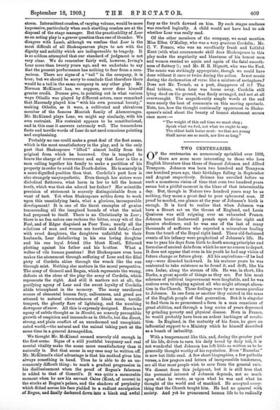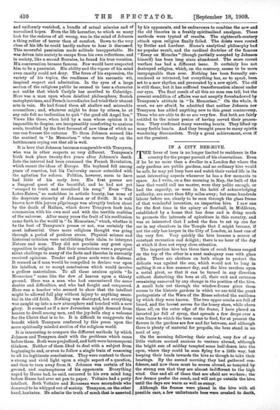TWO CENTENARIES.
OF the centenaries so numerously sprinkled over 1909, there are none more interesting to those who love English literature than those of Samuel Johnson and Alfred Tennyson. Johnson was born two hundred and Tennyson one hundred years ago, their birthdays falling in September and August respectively. Science has unrolled before us such a monstrous vision of time that even two hundred years seems but a pitiful moment in the blaze of that interminable day. But, though in Nature two hundred years may be as nothing, they mean a great deal to poor ephemeral man. If proof be needed, one glance at the year of Johnson's birth is enough. It is hard to realise that when Johnson was born a Stuart sat on the throne of England, and Louis Quatorze was still reigning over an exhausted France. Johnson heard Sacheverell preach upon divine right and passive obedience, and he was one of the last of many thousands of sufferers who expected a miraculous healing from the touch of the Royal right hand. These old-fashioned events of his infancy were prophetical of Johnson's life. He was to pass his days from birth to death among principles and formulas of ancient date from which be saw no reason to depart. It does not appear that even in his youth he had any vision of future change or future glory. All his aspirations—if he had any—were directed backward. In his maturer years he was contented to take existence as he found it, and drift, like his own Imlae, along the stream of life. He was, in short, like Burke, a great apostle of things as they are. For him most schemes of political improvement were laughable, and lie was zealous even to slaying against all who might attempt altera- tion in the Church. These feelings were by no means peculiar to Johnson. In one form or another they existed in the mass of the English people of that generation. But it is singular to find them in so pronounced a form in a man conscious of great abilities, and through a long series of years depressed by grinding poverty and physical disease. Born in France, he would probably have been an ardent harbinger of revolu- tion. In England, in the maturity of his fame, he gave an influential support to a Ministry which he himself described as a bunch of imbecility.
With a temperament like this, and, during the greater part of his life, driven to earn his daily bread by daily toil, it is not wonderful that Johnson has left little so written as to be generally thought worthy of his reputation. Even "Rasselas" is now but little read. A few short biographies, a few pathetic verses, a few prayers and letters of inexpressible tenderness, are all that most people wish to save from the general ruin. We dissent from this judgment, but it is still true that the perennial interest of Johnson depends, not so much upon what he wrote, as upon what he was and what he thought of the world and of mankind. He accepted every. thing that the Church taught him. He had no quarrel with society. And yet he pronounced human life to be radically and uniformly wretched, a bundle of actual miseries and of unrealised hopes. Even the life hereafter, to which so many look for the redress of all wrong, was in the mind of Johnson a thing rather of terror than of comfort. Down to the very close of his life he could hardly endure to hear it discussed.
This mournful pessimism made solitude insupportable. He was driven into society to escape from his own reflections, and in society, like a second Socrates, he found his true vocation.
His conversation became famous. Few would have suspected him to be a pessimist. His ability and the vigour of his mind even enmity could not deny. The force of his expression, the variety of his topics, the readiness of his sarcastic wit, inspired respect and admiration. In the eyes of a. large section of the religious public he seemed to bear a character not unlike that which Carlyle has ascribed to Coleridge.
Here was a man upon whom deistical philosophers, Scotch metaphysicians, and French incendiaries had tried their utmost arts in vain. He had found them all shallow and miserable counsellors ; and, whatever might be done by others, he at any rate felt no inclination to quit " the good old Angel Inn." Views like these, when held by a man whose opinion it is impossible to despise, are inexpressibly comforting to anxious souls, troubled by the first ferment of new ideas of which no one can foresee the outcome To them Johnson seemed like the sentinel in "In Memoriam" who moves freely on the battlements crying out that all is well.
It is here that Johnson becomes comparable with Tennyson, who was in other respects so very different. Tennyson's birth took place twenty-five years after Johnson's death.
Into the interval had been crammed the French Revolution, which recast the ideas of Europe. His boyhood fell among years of reaction, but his University career coincided with the agitation for reform. Politics, however, seem to havo had little of his early love. His first poems are a Sa.ngreal quest of the beautiful, and he had not yet "stooped to truth and moralized his song." Even "The Lotos-Eaters," so matchless in artistic beauty, has none of the desperate sincerity of Johnson or of Swift. It is well known how this joyous pilgrimage was abruptly broken short by the death of Hallam, which drove Tennyson back into communion with his own soul and with the terrible realities of the universe. After many years the fruit of his meditation came forth to the world in " In Memoriam," which, whether it be the best of Tennyson's poems or not, was certainly the most influential. Once more religious thought was going through a period of perilous stress. Physical science and historical criticism were establishing their claim to interpret Nature and man. They did not proclaim any great open opposition to religion. But their conclusions were a perpetual silent challenge to many of the facts and theories in currently received opinions. Tender and pious souls were in distress. It seemed as if man would be compelled to declare war upon his intellect, or to accept conclusions which would involve a godless materialism. To all these anxious spirits "In Memoriam" came like the dew of heaven upon a thirsty
ground. Here was a man who had encountered the same
doubts and difficulties, and who had fought and conquered. Here was a teacher who seemed to show that the intellect might be allowed full play without injury to anything essen- tial in the old faith. Nothing was destroyed, but everything was caught up into a new atmosphere and touched with a new glory. It seemed as if a new Jerusalem might descend from heaven to dwell among men, and the joy-bells ring a welcome for the Christ that is to be. It is difficult to exaggerate the benefit which Tennyson conferred by this poem upon the more spiritually minded section of the religious world.
It is interesting to compare the different methods by which Johnson and Tennyson dealt with the problems which came before them. Both were prejudiced, and both were inconsequent thinkers. Neither of them liked to deal with a subject from beginning to end, or even to follow a single train of reasoning to all its legitimate conclusions. They were content to throw a strong and vivid light upon a single aspect of a question, and then to turn away from it. Johnson was certain of his ground, and contemptuous of his opponents. Everything urged by Hume had, he said, occurred to his own mind long before Hume had ever set pen to paper. Voltaire bad a petty intellect. Both Voltaire and Rousseau were scoundrels who deserved to be whipped out of society. Tennyson, on the other band, hesitates. He admits the truth of mach that is asserted•
by his opponents, and he endeavours to combine the new and the old theories in a freshly spiritualised amalgam. These methods were typical of results. The eighteenth-century attack upon religion finally failed. The deists; were routed by Butler and Lardner. Hume's analytical philosophy had no popular result, and the cardinal doctrine of the famous "Essay on Miracles" (though partially accepted by Johnson himself) has been long since abandoned. The more recent warfare has had a different issue. It certainly has not destroyed religion, which, on the contrary, seems to be more inexpugnable than ever. Nothing has been formally sur- rendered or retracted, but everything has, so to speak, been set to a new rhythm and permeated by a new spirit. The old is still there, but it has suffered transformation almost under our eyes. The final result of all this no man can tell, but the present condition of affairs was not unaptly foreshadowed by Tennyson's attitude in "In Memoriam." On the whole, it must, we are afraid, be admitted that neither Johnson nor Tennyson has added anything new to this great controversy. Those who are able to do so are very few. But both are fairly entitled to the minor praise of having served their genera- tion. They confirmed many wavering hearts. They lifted up many feeble hands. And they brought peace to many spirits wandering disconsolate. Truly a great achievement, even if not the greatest.











































 Previous page
Previous page